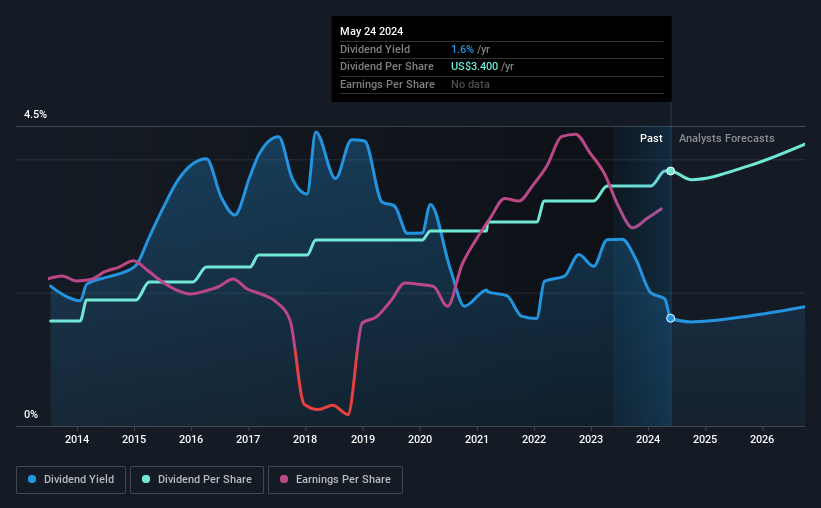There's A Lot To Like About QUALCOMM's (NASDAQ:QCOM) Upcoming US$0.85 Dividend
QUALCOMM Incorporated (NASDAQ:QCOM) is about to trade ex-dividend in the next 4 days. Typically, the ex-dividend date is one business day before the record date which is the date on which a company determines the shareholders eligible to receive a dividend. The ex-dividend date is of consequence because whenever a stock is bought or sold, the trade takes at least two business day to settle. Thus, you can purchase QUALCOMM's shares before the 30th of May in order to receive the dividend, which the company will pay on the 20th of June.
The company's upcoming dividend is US$0.85 a share, following on from the last 12 months, when the company distributed a total of US$3.40 per share to shareholders. Based on the last year's worth of payments, QUALCOMM has a trailing yield of 1.6% on the current stock price of US$210.36. We love seeing companies pay a dividend, but it's also important to be sure that laying the golden eggs isn't going to kill our golden goose! So we need to check whether the dividend payments are covered, and if earnings are growing.
See our latest analysis for QUALCOMM
Dividends are usually paid out of company profits, so if a company pays out more than it earned then its dividend is usually at greater risk of being cut. Fortunately QUALCOMM's payout ratio is modest, at just 42% of profit. A useful secondary check can be to evaluate whether QUALCOMM generated enough free cash flow to afford its dividend. Thankfully its dividend payments took up just 29% of the free cash flow it generated, which is a comfortable payout ratio.
It's positive to see that QUALCOMM's dividend is covered by both profits and cash flow, since this is generally a sign that the dividend is sustainable, and a lower payout ratio usually suggests a greater margin of safety before the dividend gets cut.
Click here to see the company's payout ratio, plus analyst estimates of its future dividends.
Have Earnings And Dividends Been Growing?
Companies with consistently growing earnings per share generally make the best dividend stocks, as they usually find it easier to grow dividends per share. If earnings decline and the company is forced to cut its dividend, investors could watch the value of their investment go up in smoke. That's why it's comforting to see QUALCOMM's earnings have been skyrocketing, up 21% per annum for the past five years. Earnings per share have been growing very quickly, and the company is paying out a relatively low percentage of its profit and cash flow. Companies with growing earnings and low payout ratios are often the best long-term dividend stocks, as the company can both grow its earnings and increase the percentage of earnings that it pays out, essentially multiplying the dividend.
Many investors will assess a company's dividend performance by evaluating how much the dividend payments have changed over time. In the last 10 years, QUALCOMM has lifted its dividend by approximately 9.3% a year on average. It's encouraging to see the company lifting dividends while earnings are growing, suggesting at least some corporate interest in rewarding shareholders.
Final Takeaway
Is QUALCOMM an attractive dividend stock, or better left on the shelf? QUALCOMM has been growing earnings at a rapid rate, and has a conservatively low payout ratio, implying that it is reinvesting heavily in its business; a sterling combination. It's a promising combination that should mark this company worthy of closer attention.
In light of that, while QUALCOMM has an appealing dividend, it's worth knowing the risks involved with this stock. Case in point: We've spotted 1 warning sign for QUALCOMM you should be aware of.
A common investing mistake is buying the first interesting stock you see. Here you can find a full list of high-yield dividend stocks.
Have feedback on this article? Concerned about the content? Get in touch with us directly. Alternatively, email editorial-team (at) simplywallst.com.
This article by Simply Wall St is general in nature. We provide commentary based on historical data and analyst forecasts only using an unbiased methodology and our articles are not intended to be financial advice. It does not constitute a recommendation to buy or sell any stock, and does not take account of your objectives, or your financial situation. We aim to bring you long-term focused analysis driven by fundamental data. Note that our analysis may not factor in the latest price-sensitive company announcements or qualitative material. Simply Wall St has no position in any stocks mentioned.

 Yahoo Finance
Yahoo Finance 
